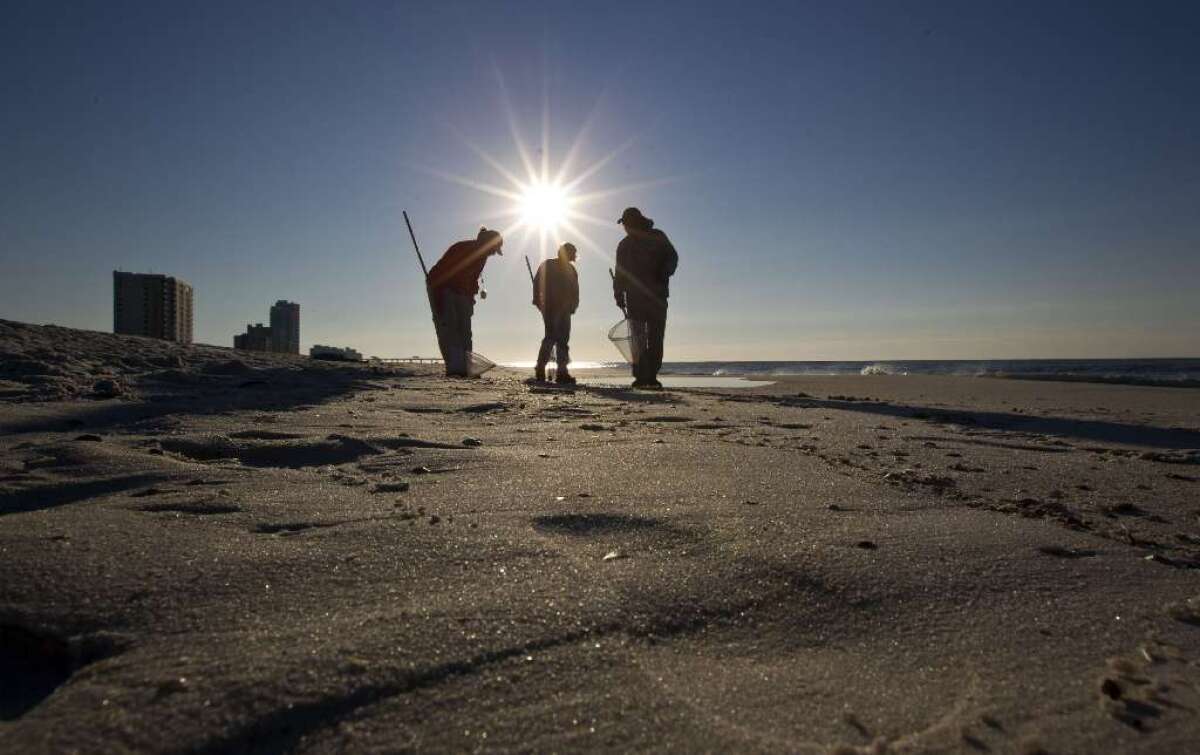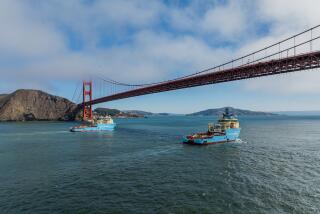Three years later, BP oil cleanup ends in some Gulf Coast states

Three years after a cataclysmic oil spill in the Gulf of Mexico, oil producer BP announced Monday that active oil cleanup had ended in three states hit by the disaster.
The gulf, the company said, is getting back to normal, a claim contested by environmental advocacy groups.
In 2010, after an explosion and fire on the company’s Deepwater Horizon oil rig, a torrent of oil from an underwater leak sludged coastlines in Louisiana, Mississippi, Alabama and Florida.
On Monday, BP announced that the U.S. Coast Guard declared active cleanup work done in each state except Louisiana, with the recovery reaching a tipping point in which the Coast Guard says dredging for remaining traces of oil would cause more harm than good.
“We’ve reached a point in some areas where the impact to the environmentally sensitive land outweighs the minimal amounts of oil being collected,” Capt. Duke Walker, federal on-scene coordinator for the Deepwater Horizon Response, said in a statement.
The company will adopt a more reactive stance on cleanup by taking direction from the U.S. Coast Guard as needed, which will investigate further reports of oil spillage.
The company, adding to its hefty bill of fines and legal losses, has spent $14 billion on cleaning up the oil, which hit about 1,100 miles of shoreline, including marshes and beaches where the oil submerged itself beneath the sand.
BP said “patrolling and maintenance activities” continued along 84 miles of Louisiana’s coast, which was hit hardest by the deluge, with 20 more miles still being evaluated for wrap-up.
“Due to the extensive cleanup effort, early restoration projects and natural recovery processes, the Gulf is returning to its baseline condition, which is the condition it would be in if the accident had not occurred,” the company said in a release.
A report from the National Wildlife Federation two months ago reached the opposite conclusion.
“Despite the public relations blitz by BP, this spill is not over,” David Muth, director of National Wildlife Federation’s Mississippi River Delta Restoration Program, said at the release of the federation’s report, which detailed the lingering damage to fish, turtle and coral life.
“Three years after the initial explosion, the impacts of the disaster continue to unfold,” Doug Inkley, senior scientist for the National Wildlife Federation and lead report author, added in an April statement. “Dolphins are still dying in high numbers in the areas affected by oil. These ongoing deaths — particularly in an apex predator like the dolphin — are a strong indication that there is something amiss with the Gulf ecosystem.”
National Wildlife Federation representatives did not immediately respond on Monday to a request for comment by the Los Angeles Times on the BP cleanup announcement.
[Update, June 10, 2:45 p.m.: David White, director of the National Wildlife Federation’s Gulf of Mexico Restoration Campaign, issued a statement in response to the announcement.
“As much as one million barrels of oil from the disaster remains unaccounted for, and tar mats and tar balls from the spill continue to wash up on the coast,” White said. “Regardless of how our shorelines are monitored, BP must be held accountable for the cleanup. We cannot just accept oiled material on our beaches and in our marshes as the ‘new normal.’ In particular, we need be sure that there is a rapid and proactive assessment and cleanup of our shorelines in the aftermath of storms.”]
[For the record, June 10, 2:45 p.m.: A previous version of this article misattributed Duke Walker’s quote to BP Executive Vice President Laura Folse. Also, the U.S. Coast Guard made the declaration to end active cleanup, not BP, as indicated in that previous version.]
ALSO:
Supreme Court orders new hearing for California raisin farmers
Judge rejects delay in Zimmerman’s trial in Trayvon Martin case
Man dies, four Boy Scouts rescued along Arizona-Nevada border
More to Read
Sign up for Essential California
The most important California stories and recommendations in your inbox every morning.
You may occasionally receive promotional content from the Los Angeles Times.











